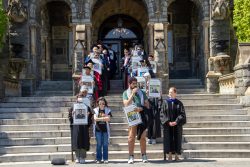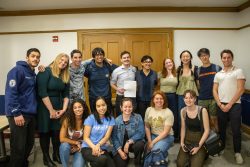2010 Campus Plan
Every ten years, Georgetown must draw up a new campus plan and present it to the District of Columbia Board of Zoning Adjustment. The plan dictates how the University will be able to develop over the next decade.
In a May meeting, Georgetown administrators and architects presented their tentative proposals for the 2010 Campus Plan to community members.
The proposals included the construction of a new hospital facility, expansion of Lauinger Library, a proposal to build a convocation center on the parking lot next to McDonough Hall, plans to use the Canal Road entrance for almost all GUTS buses, the conversion of Tondorf Road into a pedestrian walkway, a renovation of Yates, and the creation of a student lounge in New South. The plan also explored potential options for expanding on-campus housing for undergraduates and making the 1789 block on east campus into housing for graduate students.
In the meeting, neighbors voiced their concerns that too many undergraduates lived off-campus and that new buildings could cause potential traffic problems.
Sexual Assaults
Two serious sexual assaults reportedly occurred in the Georgetown neighborhood this summer.
At 3:50 a.m. on July 10, a Georgetown student was raped at her residence on the 3500 block of O Street, according to a Metropolitan Police Department report. Georgetown’s Department of Public Safety sent out a Public Safety Alert about the incident five days later, describing it simply as a “sexual assault.”
Another sexual assault reportedly occurred on the morning of July 25, when a man got into bed with a woman who was sleeping in her house on the 1800 block of 35th Street. The victim awoke to find the suspect “attempting to touch [her] while climbing on top of her [and] placing his penis on her inner thigh,” according to a MPD report.
A message about the July 25 incident was sent out to local listservs suggesting that it was connected toprevious sexual assaults allegedly committed by the so-called “Georgetown Cuddler.” However, Commander Rodney T. Parks of MPD’s Criminal Investigations Division wrote in an email that “although similar [in] appearance and method there is no other link/connection to these cases.”
Fr. King passes away
Father Thomas King, S.J., a long-time Georgetown professor and spiritual leader, died of a heart attack on June 23 at the age of 80.
King was renowned for his daily 11:15 p.m. Mass, which he had conducted for the past 40 years. He also taught theology courses, including the Problem of God.
This past year King reflected on the 40th anniversary of the 11:15 Mass in the Voice, writing, “I look back on 40 years of teaching and preaching and know they have been happy years. I truly have been blessed. I love the University and the two-fold work it has enabled me to do.”
A wake and funeral were held for King over the summer, and a memorial Mass will be held at 10 a.m. on September 24 in Dahlgren Chapel.
MSB building finished, named
After three years of construction, the new, 179,000 square foot home of the McDonough School of Business Building opened at the beginning of the summer.
On July 9, President John DeGioia announced in a school-wide email that the $82.5 million facility is being named after Rafik Hariri, the Lebanese Prime Minister who was assassinated in 2005.
Hariri’s son and current Lebanese Prime Minister Saad Hariri (MSB `92) purchased the building’s naming rights in his father’s honor for $20 million.
Contemplative Center denied
For the past few years Georgetown has been trying to build a Contemplative Center to house religious retreat programs like ESCAPE on land it purchased in the Blue Ridge Mountains of Northern Virginia in 2005.
The University experienced a setback in its plans when the Clarke County Board of Supervisors denied Georgetown’s application for a special-use permit, which would have allowed the project to move forward.
The board cited concerns about the center inviting too much residential development into the region.
Georgetown has since filed a complaint with the Clarke County Court of Appeals, calling the board’s ruling “arbitrary, capricious and unreasonable” and requesting it be reconsidered.
GUSA’s LSAT course
Georgetown University Student Association President Calen Angert’s (MSB `11) big summer project was creating a subsidized LSAT prep class. With the help of the Career Center, GUSA will be offering 25 to 30 Georgetown students the chance to take an eight-session LSAT course for $50. The class will begin in mid-September.
Angert’s Chief of Staff Tim Swenson (COL `10) said that if the LSAT class is a success, GUSA will explore expanding the program and offering subsidized courses for other tests like the MCAT, GMAT and GRE.
University launches Hoyamail
This Tuesday, the University unveiled its new e-mail system, Hoyamail. The new system uses Google Apps for Education and will give students 7 gigabytes of storage.
Because Georgetown did not want to share students’ passwords with Google, Hoyamail can only be accessed through the internet, not desktop clients or mobile devices.
The system does not include other Google applications like chat, calendar, or documents. University Information Services director Beth Ann Bergsmark said that later this fall a group of students and faculty will be formed to consider which applications to add.




